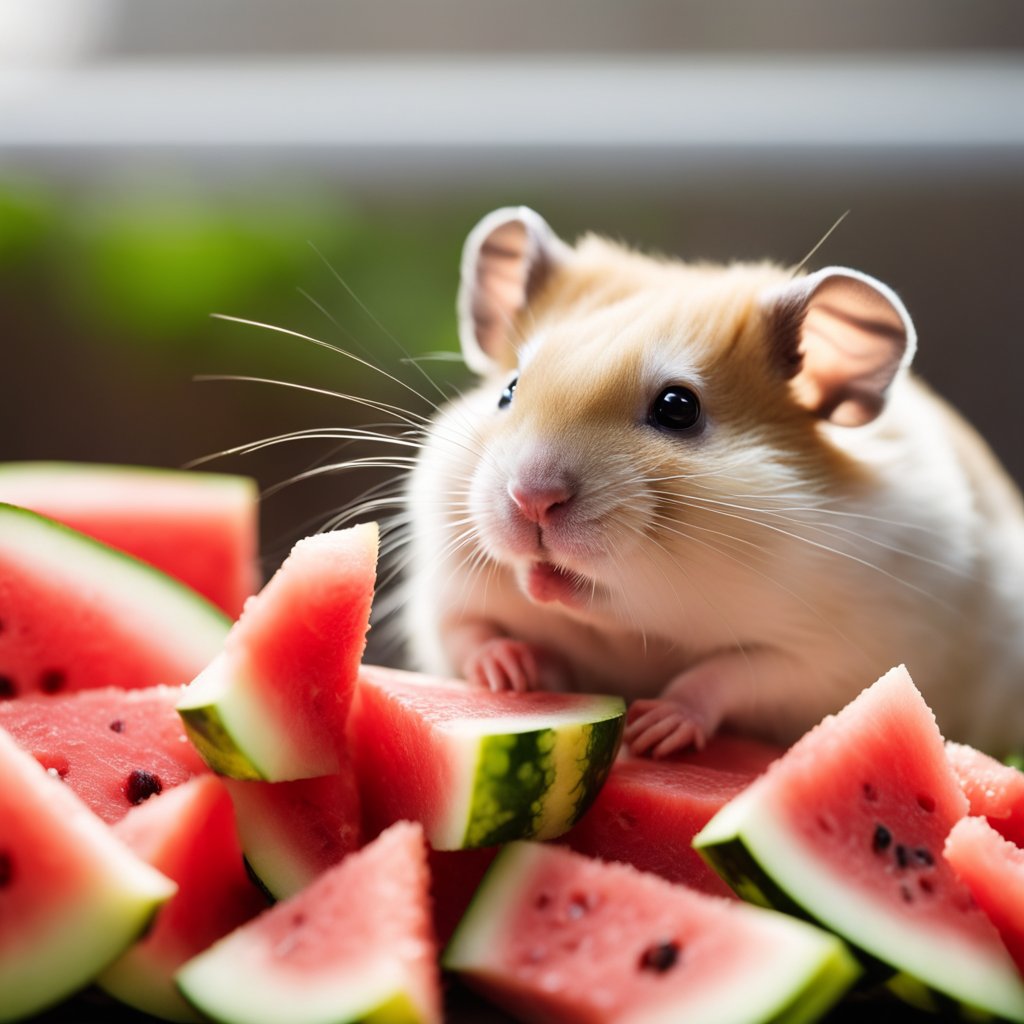Can I Feed Watermelon to My Hamster? A Clear and Knowledgeable Answer
Watermelon is a beloved summer fruit, known for its sweet and refreshing taste. As a pet owner, you may be wondering if it’s safe to share this treat with your furry friend, the hamster. While hamsters are omnivores and can eat a variety of fruits and vegetables, not all are safe for them to consume. In this article, we’ll explore whether watermelon is a healthy addition to your hamster’s diet.
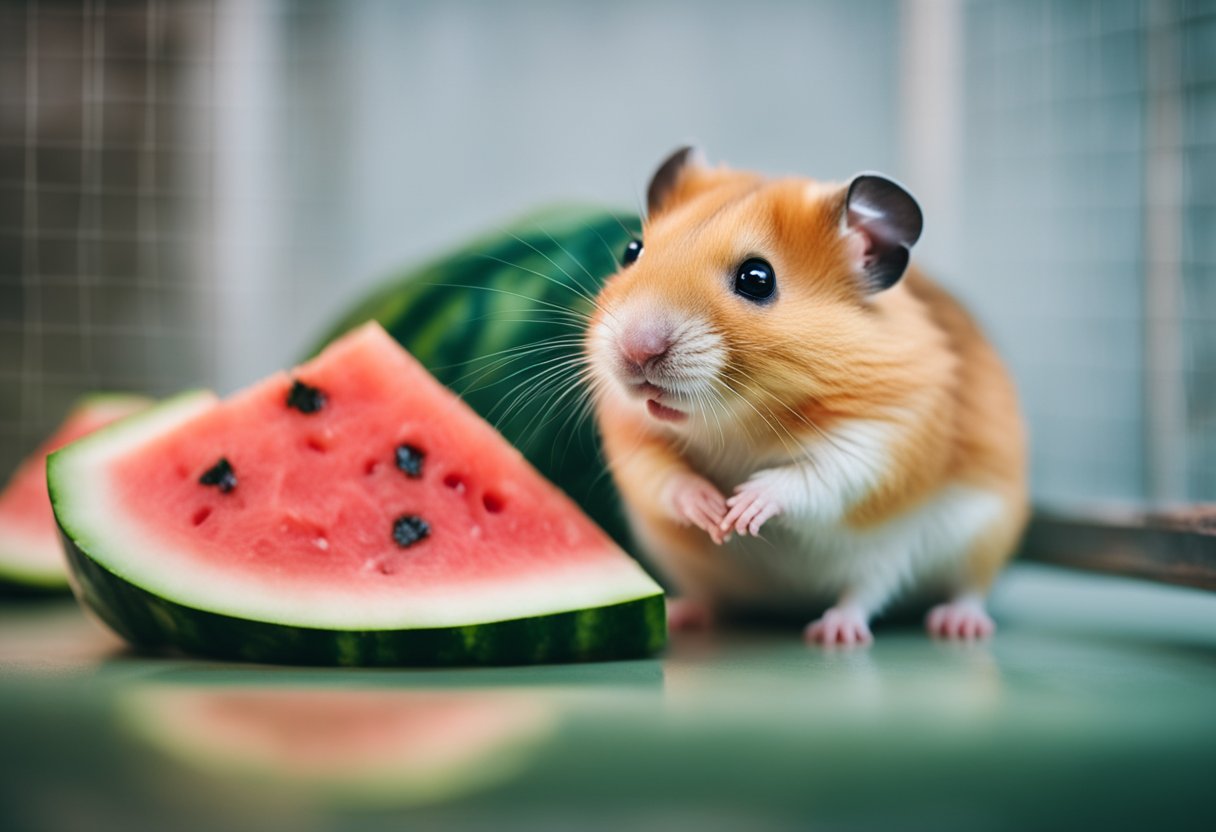
Before diving into whether hamsters can eat watermelon, it’s important to understand their dietary basics. Hamsters require a balanced diet that includes protein, fiber, and other essential nutrients. Their diet typically consists of commercial hamster food, fresh vegetables, and occasional treats. While fresh fruits can provide vitamins and minerals, they should be given in moderation due to their high sugar content. Now, let’s explore whether watermelon is a safe and healthy option for your hamster.
Key Takeaways
- Hamsters can eat watermelon in moderation as a treat.
- Watermelon should be given in small amounts and without the seeds or rind.
- While watermelon can provide vitamins and minerals, it should not replace a balanced hamster diet.
Hamster Dietary Basics
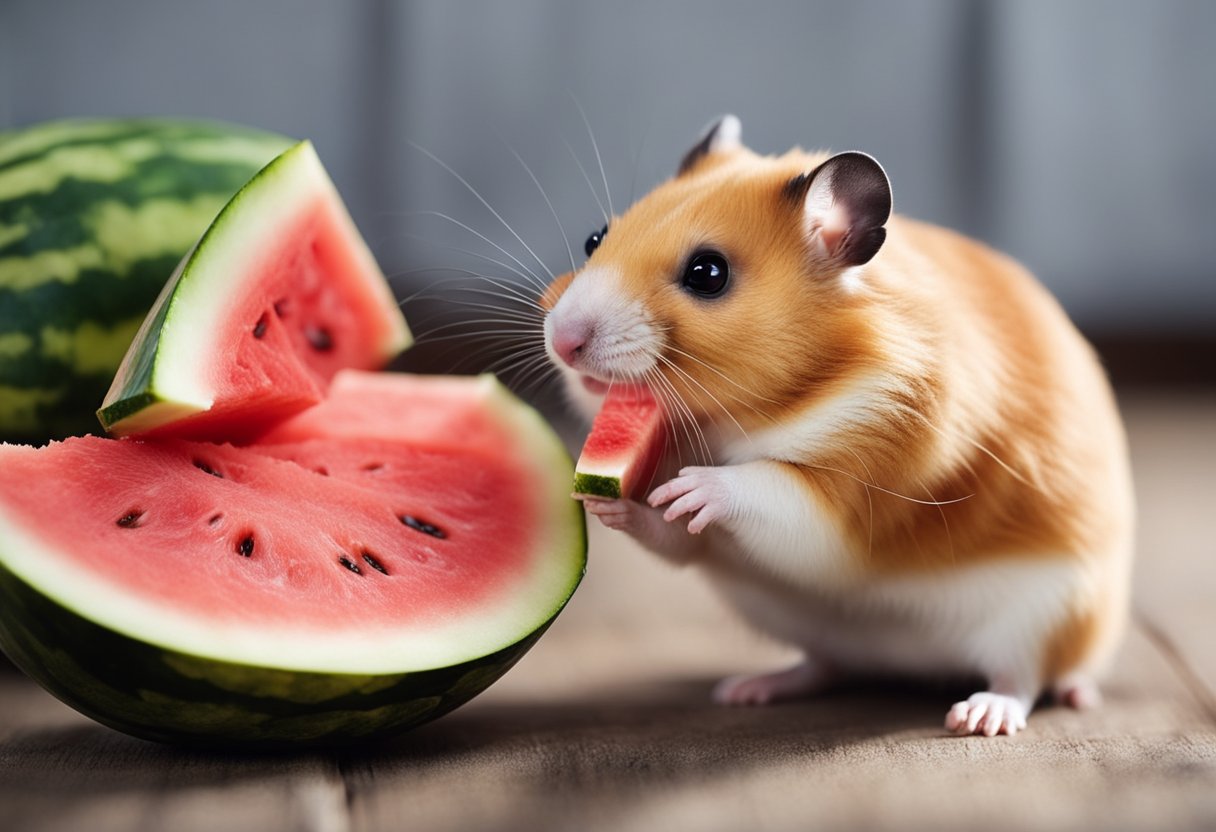
Hamsters are adorable, cuddly creatures that make great pets. They are also quite active and require a healthy diet to keep them healthy and happy. In this section, we’ll cover the basics of a hamster’s nutritional needs, safe foods for hamsters, and foods to avoid.
Nutritional Needs
Hamsters require a balanced diet that includes protein, fat, carbohydrates, vitamins, and minerals. A diet that is high in fat and low in protein can lead to obesity and other health problems. Hamsters also need plenty of fiber to keep their digestive system healthy.
Safe Foods for Hamsters
Hamsters can eat a variety of foods, including fruits, vegetables, and grains. Some of the best foods for hamsters include:
- Apples
- Bananas
- Blueberries
- Carrots
- Cucumbers
- Grapes
- Peas
- Spinach
Watermelon is also safe for hamsters to eat in moderation. According to Hamster Wonder, “Feeding small amounts of watermelon can help keep hamsters hydrated. Watermelon is packed with antioxidants that can promote overall health in hamsters.” However, it’s important to only provide one teaspoon per week to prevent overfeeding.
Foods to Avoid
While hamsters can eat a variety of foods, there are some foods that should be avoided. These include:
- Chocolate
- Citrus fruits
- Garlic
- Onions
- Potatoes
- Rhubarb
- Seeds and nuts (except for a few specific types)
These foods can be toxic to hamsters and can cause digestive problems or even death. It’s important to always research before feeding your hamster any new foods to ensure they are safe.
In summary, hamsters require a balanced diet that includes protein, fat, carbohydrates, vitamins, and minerals. Safe foods for hamsters include fruits, vegetables, and grains, including watermelon in moderation. Foods to avoid include chocolate, citrus fruits, garlic, onions, potatoes, rhubarb, and most seeds and nuts.
Feeding Watermelon to Hamsters
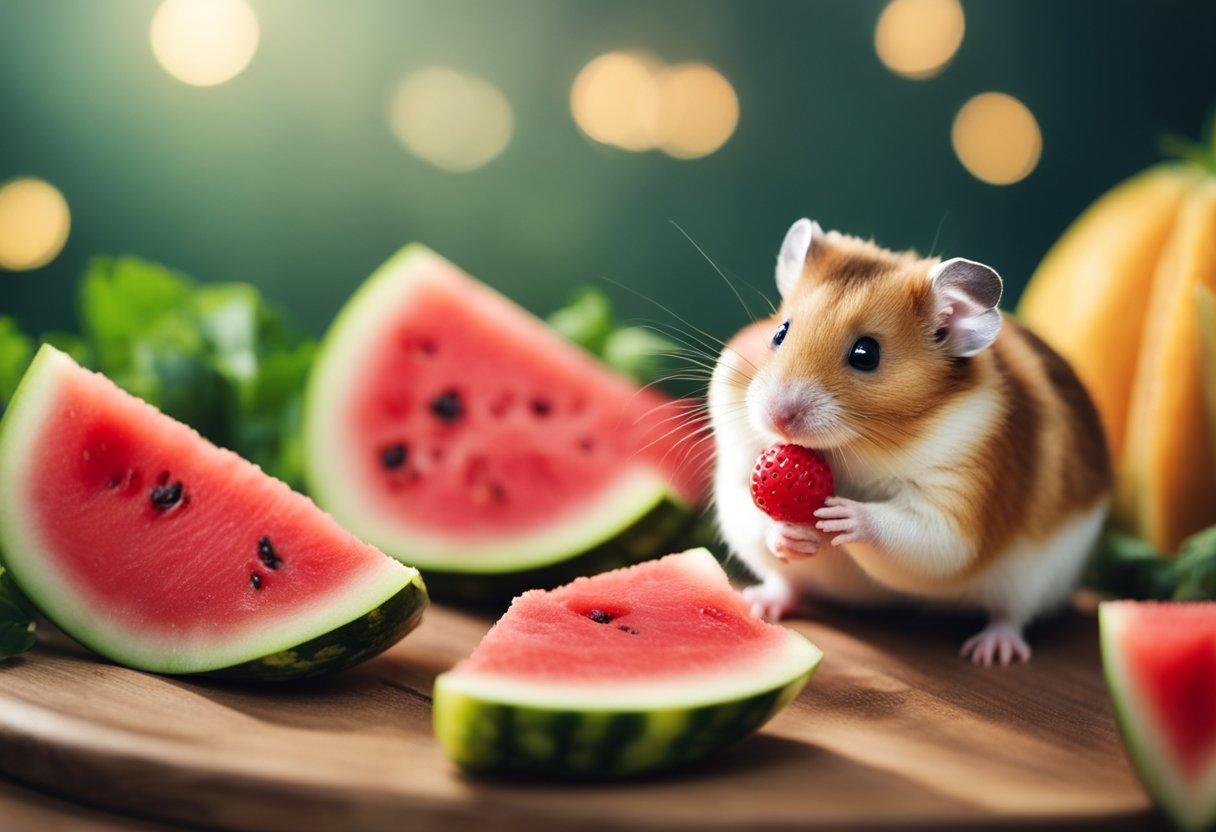
If you’re wondering whether you can feed watermelon to your hamster, the answer is yes. Watermelon is a safe fruit for hamsters to consume, but as with any food, it should be given in moderation. Here are some things to keep in mind when feeding watermelon to your hamster.
Health Benefits
Watermelon is a great source of vitamins and minerals that can benefit your hamster’s health. It contains vitamin C, which can boost your hamster’s immune system and help prevent illness. Additionally, watermelon is rich in potassium, which can help regulate your hamster’s blood pressure and support healthy heart function.
Potential Risks
While watermelon is generally safe for hamsters to eat, there are some potential risks to keep in mind. First, too much watermelon can cause diarrhea in hamsters, so it’s important to limit the amount you give them. Additionally, the seeds and rind of the watermelon should be removed before feeding it to your hamster as they can be difficult for them to digest.
Serving Size and Frequency
When feeding watermelon to your hamster, it’s important to keep serving size and frequency in mind. Hamsters only need small amounts of fruit in their diet, so a few small pieces of watermelon once or twice a week is sufficient. It’s also important to remove any seeds and the rind before feeding it to your hamster to prevent digestive issues.
Overall, watermelon can be a healthy and tasty treat for your hamster when given in moderation. Just be sure to follow these guidelines to ensure your hamster stays healthy and happy.
Resources
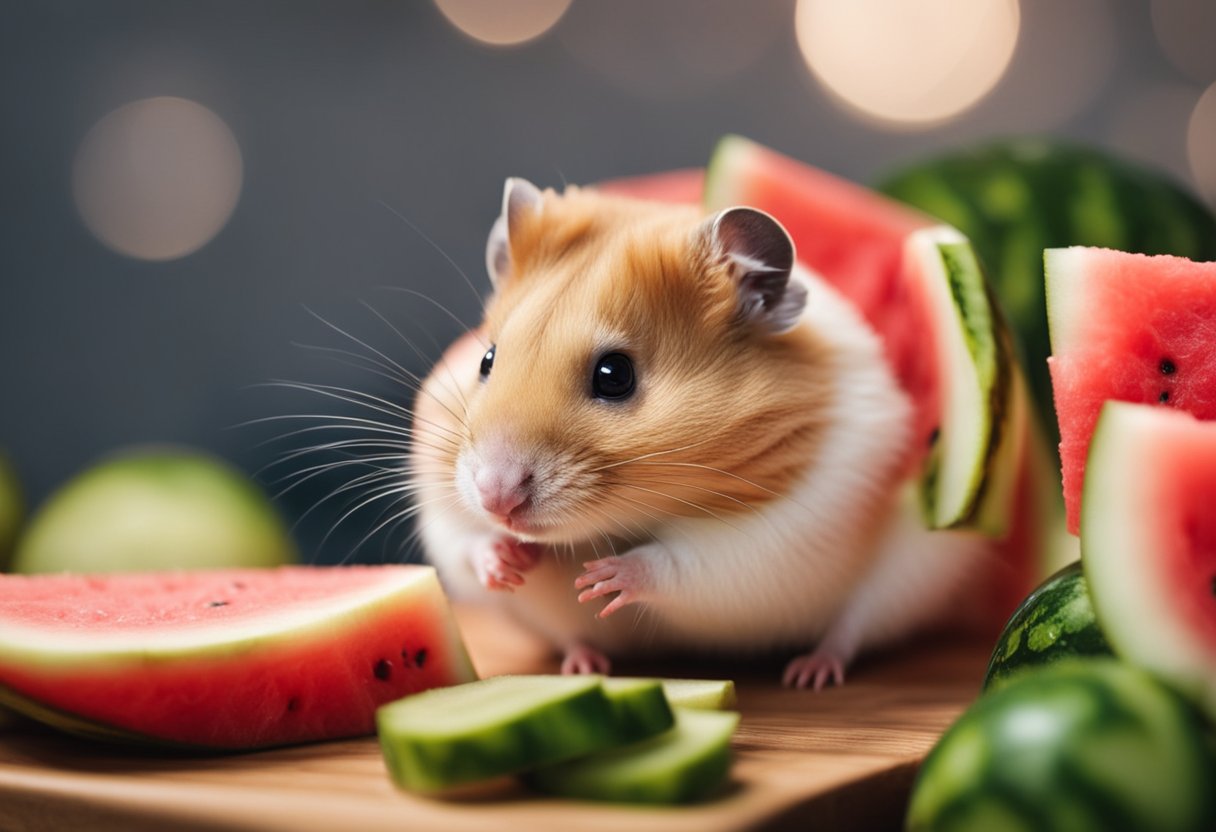
When it comes to feeding your hamster watermelon, it is important to ensure that you are providing them with the right amount of this fruit. While watermelon is generally safe for hamsters to consume, it should only be given in small amounts as an occasional snack rather than a regular part of their diet.
According to Pet Keen, watermelon is a good source of vitamins and minerals that can be used by hamsters for just about everything, including immune system function, gut motility, vision, growth, and metabolism. However, there are other, healthier food alternatives that offer similar benefits.
To prevent insecticides, it is important to wash your hands before handling watermelon for your hamster. Additionally, you should choose unsalted watermelon, as salt may be harmful to your hamster. It is also important to note that while hamsters of all breeds can eat watermelon, including Dwarf, Syrian, and Robo hamsters, fruit should be provided occasionally and in moderation due to its sugar content.
According to Hamsters Info, when giving watermelon to your hamster, it is important to remove the seeds and rind before feeding it to them. The seeds can be a choking hazard for hamsters, and the rind is difficult for them to digest.
Overall, while watermelon can be a refreshing treat for your hamster, it should only be provided in moderation and as part of a balanced diet. It is important to research and understand what foods are safe and appropriate for your hamster to ensure their health and well-being.
For more information on hamster care and diet, check out Hamster Corner and Hepper.
Conclusion
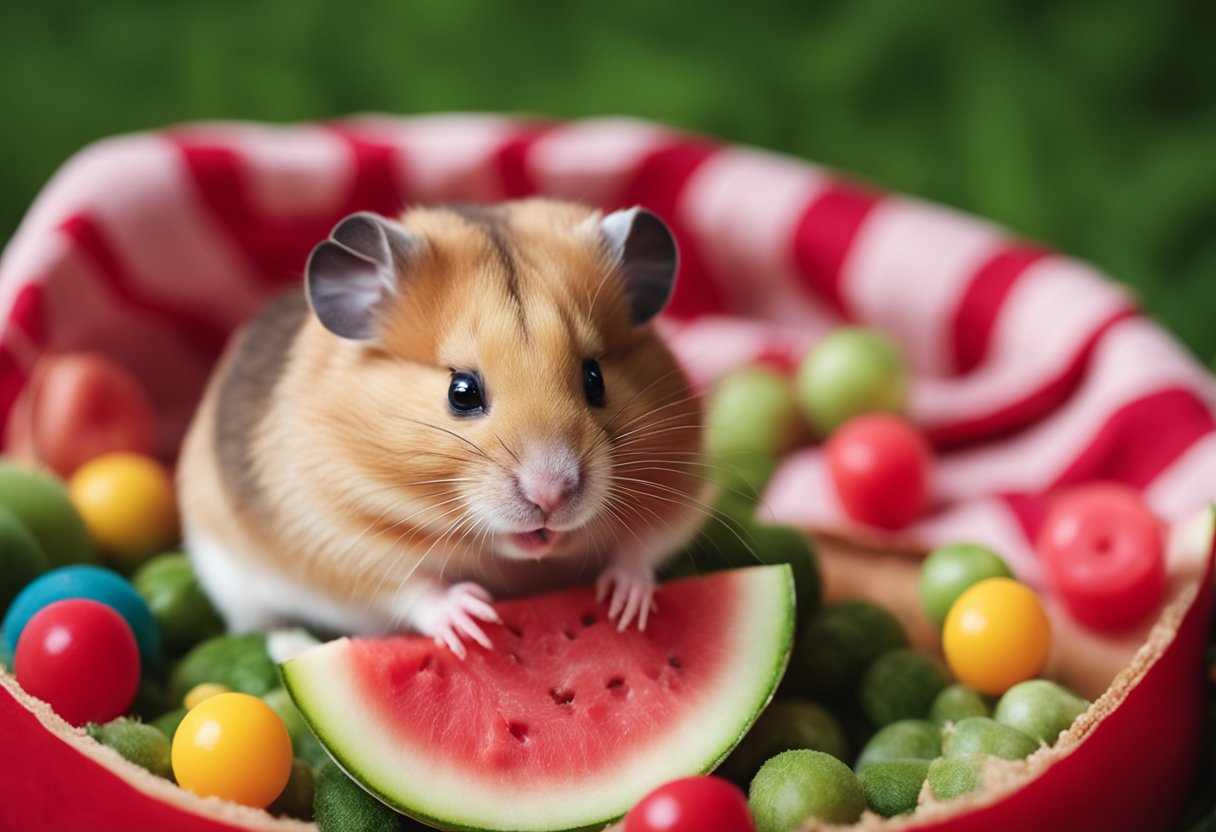
In conclusion, watermelon is a safe and healthy treat for your hamster in moderation. While it is a good source of vitamin C, potassium, and other nutrients, it should not be the main component of your hamster’s diet.
When feeding watermelon to your hamster, make sure to remove the rind and seeds, as they can be a choking hazard. Additionally, only give your hamster a small amount of watermelon at a time, as too much can cause diarrhea and upset stomach.
Remember to always prioritize your hamster’s health and well-being by providing a balanced and varied diet that includes a mix of fruits, vegetables, and high-quality hamster food. If you have any concerns about your hamster’s diet or health, consult with a veterinarian who specializes in small animals.
Overall, feeding your hamster watermelon can be a fun and healthy way to provide them with a tasty treat. Just be sure to follow the guidelines outlined above to ensure that your hamster stays happy and healthy.
Frequently Asked Questions
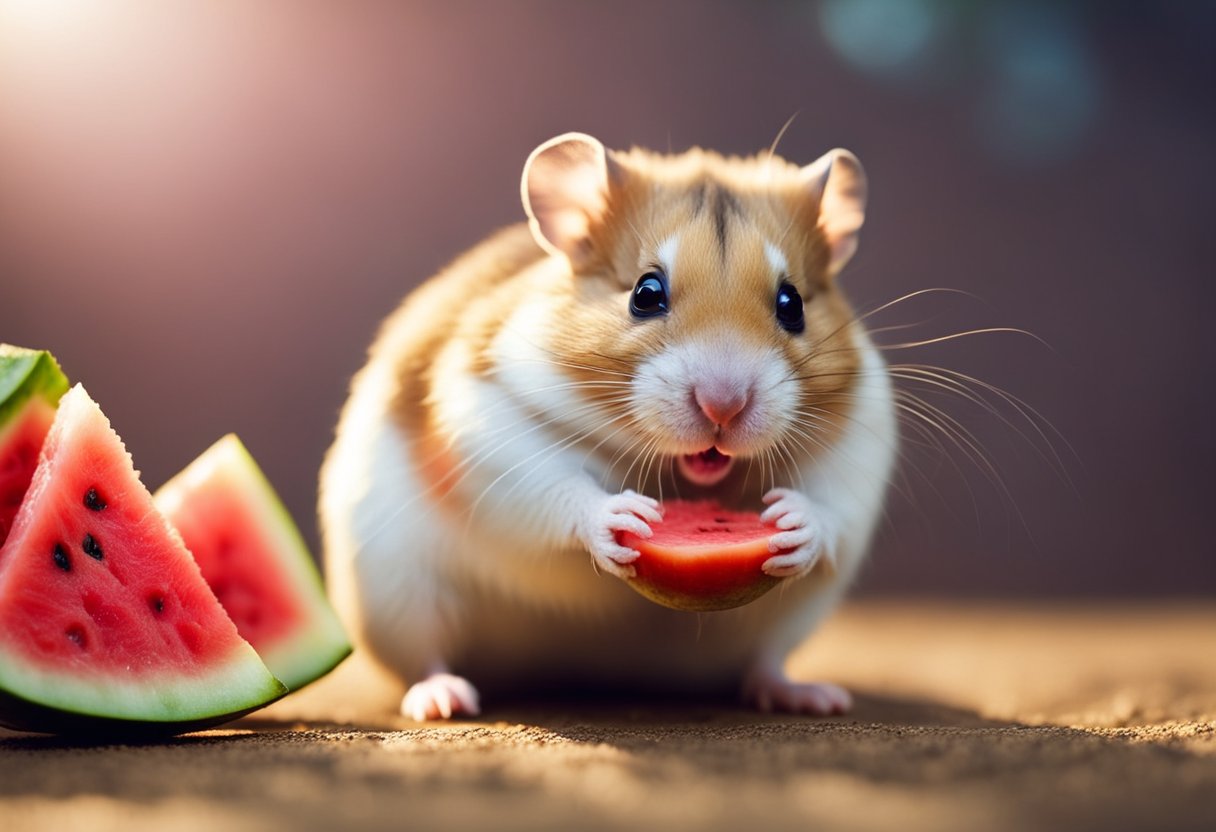
What fruits are safe for hamsters to consume?
Hamsters can consume a variety of fruits, but it is important to remember that fruits should be given to hamsters in moderation. Some of the fruits that are safe for hamsters to consume include apples, bananas, strawberries, blueberries, raspberries, and watermelon. However, not all fruits are safe for hamsters to eat, and some fruits can be toxic to hamsters. It is best to do your research before introducing any new fruits to your hamster’s diet.
Are there any risks associated with feeding hamsters watermelon seeds?
Watermelon seeds are generally safe for hamsters to consume, but it is important to note that they can be a choking hazard. If you choose to feed your hamster watermelon seeds, make sure to remove the seeds from the watermelon first and crush them before feeding them to your hamster.
Can feeding watermelon skin to hamsters cause health issues?
Feeding watermelon skin to hamsters is not recommended. The skin of the watermelon is tough and can be difficult for hamsters to digest. In addition, the skin of the watermelon can contain pesticides and other harmful chemicals that can be harmful to your hamster’s health.
Is it safe for Dwarf hamsters to eat watermelon?
Yes, it is safe for Dwarf hamsters to eat watermelon. However, as with all fruits, it should be given to them in moderation. Dwarf hamsters have smaller bodies and may not be able to handle large amounts of watermelon.
What should I avoid feeding my hamster to ensure their health?
There are several foods that you should avoid feeding your hamster to ensure their health. These include chocolate, caffeine, alcohol, garlic, onions, and sugary or salty foods. These foods can be toxic to hamsters and can cause serious health issues.
Are there any fruits that hamsters are commonly allergic to?
Hamsters are not commonly allergic to fruits, but they can develop allergies to certain fruits over time. If you notice any signs of an allergic reaction in your hamster, such as itching, swelling, or difficulty breathing, stop feeding them that fruit immediately and consult with your veterinarian.
